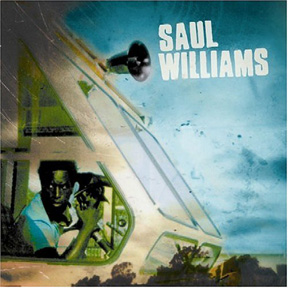 by: Sun-J
by: Sun-J
Poetry is the most versatile element of communication. Mythology was transcribed through generations by prose and verse. Poetry can be spoken, sung, rapped, or even painted. Saul Williams manifests all of these elements. From his poetic tirades, to his soft-spoken singing, to his aggressive emceeing to his vivid acting. On screen you can catch Saul Williams in Slam or K-Pax, and when it comes to music, he is everywhere. Saul Williams' style has so many faces, he has successfully toured with Cursive, Blackaliscious and Mars Volta.
In 2001, Williams released a Rick Rubin's produced LP, Amethyst Rocker, prompting many Britts to proclaim it album of the year. Since then there have been a slew of performances, EPs and books. 2004 marks the year of his best work to date. His new self titled LP is a fusion of hip hop and rock, and in Saul's own words; "the tracks range from politics to relationships to the politics of relationships. What I ended up with was something that captured the authoritative cool of hip- hop, the playful angst of rock and roll, the raw emotional torment of emo, and the 'f*ckoffness' of punk." The opening track, "Talk to Strangers" incorporates a unique piano melody and embraces the emotions of our own self consciousness with powerful, inspiring lyrics such as, "The earth is not a flat screen, I ain't trying to fit in...." and "No I wasn?t raised at gun point, and I?ve read too many books, To distract me from the mirror, when unhappy with my looks." "Grippo" blends race with hip-hop and rock which is evidenced by the fusion of funky rhythms, and wailing guitar. Williams perhaps vocalizes the quote of the year; "I gave hip-hop to white boys when nobody was looking, They found it locked in a basement when they gentrified Brooklyn, I left a list of instructions, an MPC, and a mic, My sci-fi library and utensils to write..." "Telegram" is an influential attack on the elements of hip hop which inspire bling bling and murder, blinding society of the real solution, politics. "Act III Scene 2 (Shakespeare)" features Zack De La Rocha and meshes the current state of war fare with Shakespeare's Julius Caesar as La Rocha belts, "This one goes out to my man, Taking cover in the trenches with a gun in his hand, Then gets home and no one flinches when he can't feed his fam, But Brutus is an honorable man." The cut is full of energy but lacks a sonically pleasant element. "List of Demands (Reparations)" is full of aggression and rage ("I got a list of demands, written on the palm of my hands, I ball my fist and you?re gonna know where I stand...") with its pounding drums and metal guitar while "African Student Movement" verges on being a bit too forceful with its afro centric themes. "Black Stacey" is a story of Williams?s childhood, and his struggle to deal with society and his inherited culture. "PG" features the soft vocals of Williams singing while "Seaweed" translates coarse poetic imagery manifesting through a fusion of music. The closing track "Notice of Eviction" is a spoken word, optimistic view on our current state of anger and conviction, and will leave listeners with a sense of satisfaction and hope.
Many conservatives will stereotype Saul Williams because of his brash style. Though, Williams is not an ethnocentric African American, but a politically conscious, soulful extension of urban black culture. He is deeply emotional with his vocal chords range from testosterone induced masculinity, to petite feminine whispers. In an era where popularity is often dictated by instrumentation, Williams commands disagreement as his voice controls the melody, not vice versa. Saul Williams represents the small group of radicals in urban music with the likes of Andre 3000, Common, Cee Lo, Erykah Badu, Lauryn Hill and Mr. Lif. When listening to this CD, to maximize enjoyment, don't focus on the music, instead concentrate on Saul's messages.
Share
|
|

